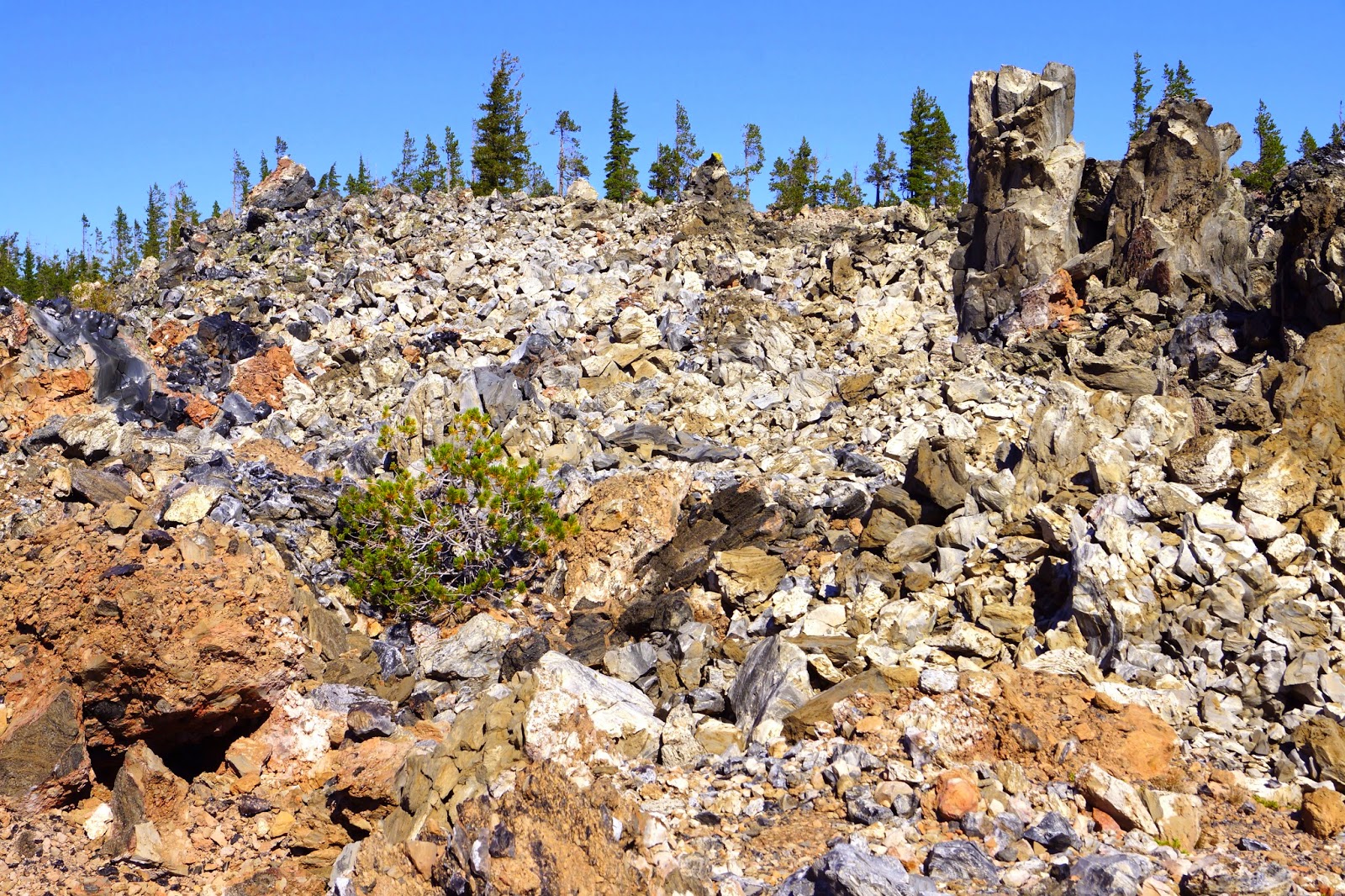While in Tionesta, California, I ventured to yet another location created by hot lava, this time a whole mountain of it! Much of it is obsidian, the hardest kind of volcanic rock sometimes called glass because of its high silica content, and shiny, brittle character. It's part of the same Medicine Lake Volcano that Lava Beds National Monument is, and is very close to Medicine Lake itself.
From tiny Tionesta, the local Route 97 West takes you almost there, then there are signs directing you to Glass Mountain. Google Maps is not very helpful as it shows every logging road and makes no distinction between two dirt ruts and paved roads in this area. Barbara and Craig at Eagle's Nest RV Park provided a great local map to help out. Here's what Glass Mountain looks like in Google Maps satellite view in which you can see the gray lava flows. I probably explored about one hundredth of the area.
After parking at the edge of the lava flow, there is a narrow road winding through the flow that is stable and safe to walk on. This is not part of the national monument, and it looks as if a private enterprise is quarrying the obsidian here. At first it just looks like a massive gray pile of rock rubble. (And I mean really massive. - like two or three stories high above the trail in some places.) But as you walk through, veins of red and black obsidian begin to show amongst the dramatic upthrusts of frozen lava.
In some places you can see the flow lines of the lava.
Here are some of the interesting varieties of obsidian.
Almost nothing has grown on the whole mountain,
but in places along the edge a few evergreen trees have taken root.
It was a really unique experience, very other-worldly. Here's Ms. Subaru waiting patiently for my return. You can see how high the piles of rock are just here at the edge of the flow.
Being an Easterner originally, I really had no idea how much of the west is volcanic in origin. Aside from the obvious volcanoes that everyone has heard of: Mounts Shasta, Lassen, Hood, St, Helens and Rainier, there are so many others, plus the shield volcanoes, and countless lava flows across the northwest. What a different landscape all this volcanic activity has created compared to the granite of the northeast, the limestone of the midwest and the sandstone of the southwest. What incredible variety of landscapes North America offers up. I guess that's why we're on the road in this vast and wonderful country.







Pretty dramatic stuff! There is a large obsidian flow (as well as other interesting sights) in Newberry National Volcanic Monument near Bend, OR that is worth checking out.
ReplyDeleteYes, we visited Newberry and "The Big Flow" earlier this summer when up in Bend. Newberry is very similar in size and shape, but all black and shiny, so it's "prettier."
DeleteThanks for the preview, we will be there at the beginning of OCT. How did you like the Eagles Nest RV Park?
ReplyDeleteHi Hans,
DeleteWe liked Eagle's Nest. It's quiet, with nice green sites of medium size. If you can get the last on in the center row - it's the biggest and best. There are no toilets or laundry, but there are full hook ups. Friendly and helpful owners. Very reasonably priced. It was $100 for the week, plus electric. Very remote. No AT&T or Verizon signal. No gas or grocery store close by, so you have to drive to Tulelake or Klamath Falls for services. It's convenient only to Lava Beds NM, Glass Mountain and Medicine Lake. Be careful if you use Google Maps to get there, as it will take you down very tight, bumpy, dirt roads that you don't need to go on. Stay on asphalt 97 until you see the sign for the two RV parks in Tionesta and just follow the signs. Eagle's Nest is at the very end of that road.